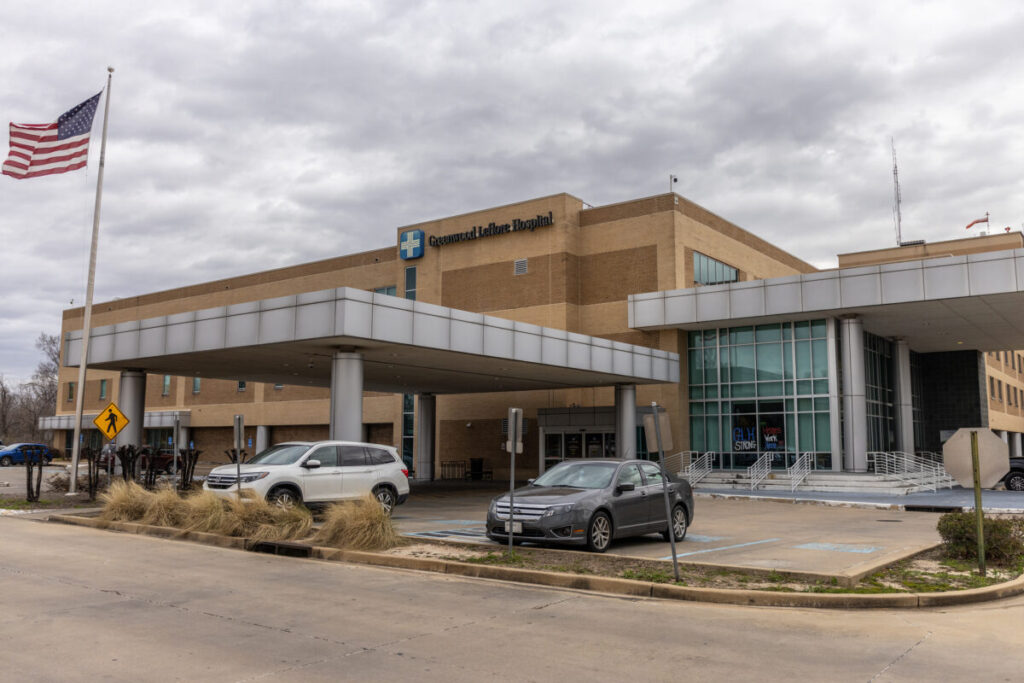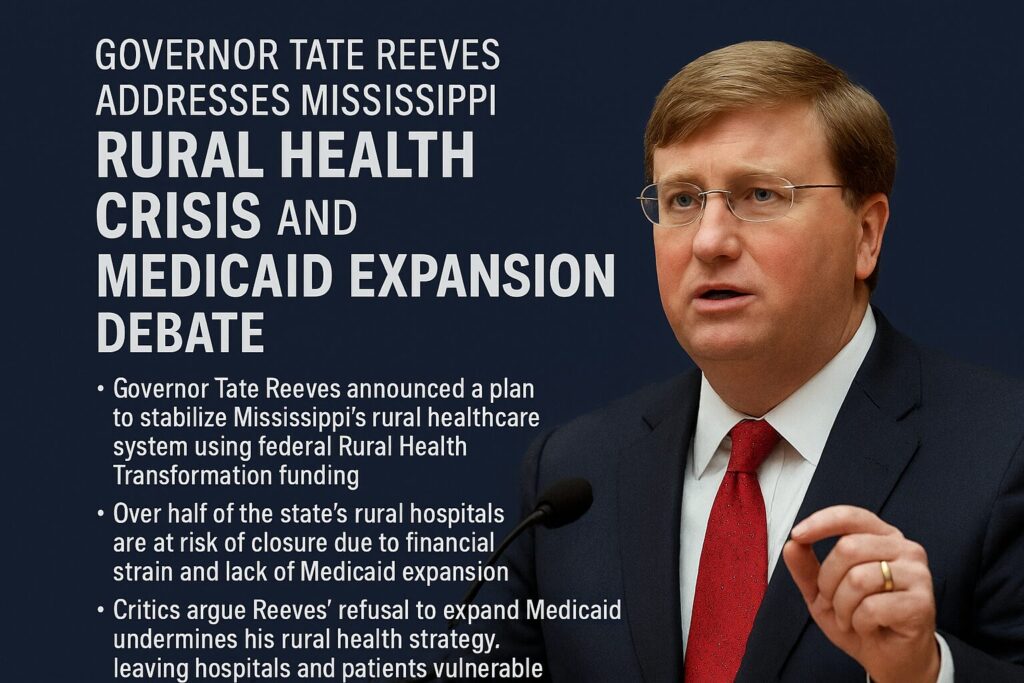
Mississippi’s rural healthcare system is hanging by a thread. Governor Tate Reeves says he’s on it, promising to protect small hospitals, support medical workers, and strengthen care in small towns. But here’s the real question: is this leadership or lip service?
The State of Rural Health in Mississippi
If you’ve been paying attention, you already know Mississippi’s rural healthcare system has been struggling for years. Over half of the state’s rural hospitals are at risk of shutting down, according to multiple reports including an October analysis from Mississippi Today. Emergency rooms are closing, labor and delivery units have vanished in several counties, and the number of Mississippians traveling over an hour for basic care has jumped dramatically. These aren’t just statistics they’re the lived reality for families from the Delta to the Pine Belt. A missed appointment can mean a missed paycheck. A long ambulance ride can mean a life lost. It’s that serious. Now, add in the state’s historically high uninsured rate, limited mental-health resources, and a shrinking healthcare workforce, and you’ve got a full-blown crisis. It’s no wonder advocates have been begging for action.
The Governor’s Pitch: Strategic Spending, Not More Government
Governor Tate Reeves finally spoke out about the situation after months of pressure from local leaders, health directors, and rural residents. His message? Help is coming, but it won’t come through the old way of doing things. At the heart of Reeves’ approach is the Rural Health Transformation Program, a new federal initiative born from what he called one big beautiful bill. The program offers states hundreds of millions in federal funding to stabilize rural hospitals and expand services. Mississippi’s slice could reach up to $500 million, depending on its final proposal. Reeves has directed the Mississippi Division of Medicaid and the State Department of Health to create a plan to apply for the funding before the end of the year. The plan is supposed to include local feedback from hospital boards, medical professionals, and residents. On paper, that sounds promising. But the governor’s tone was measured—cautious even. In recent press statements, Reeves has repeated a familiar refrain: Mississippi doesn’t need more federal control, it needs smarter local investment.
He said, “We must ensure that any plan we adopt fits Mississippi, not Washington, D.C. We’ll use every available dollar wisely to strengthen our hospitals and protect access to care for our rural citizens.” It’s a classic conservative approach—practical, controlled, and careful not to appear dependent on federal aid.
What the Governor Won’t Do: Expand Medicaid
Here’s where Reeves draws his line in the sand. Despite calls from hospital CEOs, doctors, and both Republican and Democratic lawmakers, he’s still rejecting Medicaid expansion under the Affordable Care Act. Reeves argues that expanding Medicaid would grow government dependency and add financial burden to the state. He’s stood by that position even as other red states like North Carolina reversed course and expanded coverage. Critics say that stance undermines any rural health plan from the start. Medicaid expansion would extend coverage to an estimated 200,000 low-income Mississippians, bringing in billions in federal money while relieving hospitals from the crushing weight of unpaid care. Without it, hospitals continue treating uninsured patients with no reimbursement a slow financial death sentence for small facilities.
Dr. LouAnn Woodward, vice chancellor of the University of Mississippi Medical Center, put it bluntly last month: “Without expanded coverage, these rural hospitals are trying to survive without oxygen.” So yes, the Rural Health Transformation Program could be a lifeline, but only if the state also addresses the structural problems that keep hospitals gasping for air.
Where the Money Might Go
The proposed plan could include several targeted strategies including infrastructure upgrades, repairs, facility modernization, and equipment updates in hospitals that have been running on outdated systems; telehealth expansion, building on Mississippi’s leadership in telemedicine, especially for behavioral health and chronic disease management; workforce incentives like bonuses or loan repayment programs for nurses, doctors, and EMTs who commit to serving in rural counties; and mobile or urgent-care units to bring care directly to underserved communities through mobile clinics and expanded ambulance networks. Those moves could make a real impact if they’re funded properly and rolled out transparently. But there’s another hard truth: even $500 million in federal funding can’t fully undo decades of disinvestment. According to the Magnolia Tribune, the Rural Health Transformation Program may only offset about one-third of expected Medicaid-related revenue losses statewide. That means the money helps, but it doesn’t fix.
What’s Missing: Local Voices and Long-Term Vision
Right now, the state has opened a public survey for citizens and healthcare workers to share their input on the rural health plan. But so far, few people even know it exists. If the governor wants this to succeed, it can’t be a top-down operation. Mississippi’s rural communities are unique what works in Panola County might not work in Holmes County. Jackson and the Delta face drastically different challenges from the coastal counties. A one-size-fits-all approach won’t cut it. Advocates say Reeves should make community involvement a central part of the plan, not an afterthought. Public meetings, listening tours, even town hall sessions in hospital cafeterias could help shape a plan that actually reflects Mississippi’s diversity and needs.
The Political Reality
Let’s call it what it is: rural health is now a political football. Reeves wants to appear proactive without conceding ideological ground on Medicaid. Democrats and moderate Republicans want to fix hospitals before they vanish. And communities just want their ERs to stay open. The result? A slow-moving policy tug of war while hospitals keep bleeding money. The political optics may be polished, but the math still hurts. If nothing changes, more hospitals will close before any plan takes effect. Each closure leaves behind empty buildings, lost jobs, and families forced to drive 60 miles just to deliver a baby or treat a broken arm.
Why This Matters Beyond Health Care
When a rural hospital closes, it doesn’t just hurt patients it kills small-town economies. Hospitals are often the largest employer in their area. Closing them means lost jobs, lost tax revenue, and fewer reasons for businesses to stay or relocate. For Black and low-income residents, especially across the Delta, the consequences are devastating. Rural health is racial equity, economic development, and community survival rolled into one. When Reeves talks about protecting rural Mississippi, the question isn’t whether he means it it’s whether he’ll go far enough to make it real.
The Road Ahead
The next few months will be telling. The governor’s office is expected to submit its final Rural Health Transformation Plan before year’s end. Watch for which hospitals and counties are prioritized for funding, whether Medicaid expansion re-enters the conversation in 2026, how transparent the spending process is, and whether public input truly shapes the final plan. Mississippi’s rural health system doesn’t have time for politics. It needs action, and it needs it yesterday.
Final Word
Governor Reeves deserves credit for acknowledging the crisis and moving toward a plan. But let’s be honest the plan’s success won’t be measured in press releases. It’ll be measured by whether families in places like Humphreys, Bolivar, and Marion Counties can get care when they need it. Until then, the question hanging over the Magnolia State remains: will Mississippi fix its rural health system, or will it just keep patching the holes?












